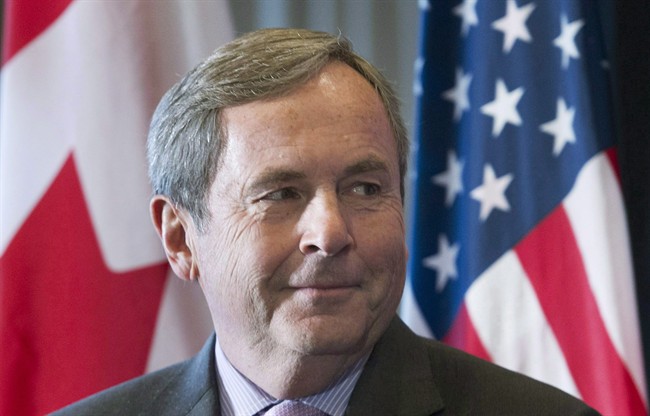The time for bluster and bombast over the future of NAFTA is over, and talks must now focus on finding a way forward, and not on who can score the greatest win.

That was the message Canadian ambassador David MacNaughton brought to a meeting of the Energy Council of Canada on Monday, where both he and his American counterpart delivered remarks focused on the energy relationship between Canada and the United States.
READ MORE: Time to ditch the ‘toxic’ NAFTA name, says former U.S envoy
Both, however, offered notable differences in their focus.
MacNaughton largely focused on the need for collaboration and cooperation with community members when considering energy projects and the building of infrastructure such as pipelines. He also waded more broadly into the ongoing renegotiation of NAFTA. He called for an end to bravado in discussions over the 24-year-old continental free trade deal.
“I think the time of rhetoric is probably past us, that we should roll up our sleeves … and get on with building the most competitive relationship in the world,” he said.
“Our challenge is not whether Canada is going to win against the United States or the United States is going to win against Canada or Mexico. It is whether or not we remain competitive on a global basis with the rest of the world. The more we spend our time focusing on who is winning and who’s losing, that challenge will be more and more difficult.”

WATCH ABOVE: Former U.S. Ambassador to Canada Bruce Heyman says the term NAFTA is toxic and the deal needs a rebrand
U.S. President Donald Trump campaigned on a pledge to withdraw from NAFTA, which allows for the free flow of goods across industries between Canada, the U.S., and Mexico.
He has suggested the benefits of the deal are significantly more tilted in favour of Canada and Mexico at the expense of the U.S., despite Canada being the top export market for nearly all American states.
READ MORE: Trudeau: Canada could walk away from NAFTA over ‘multiple issues’
Following his election, the Canadian government quickly pulled together a “war room” on Canada-U.S. relations and has dispatched successive waves of officials to tout the benefits of the deal south of the border.
Kelly Craft, the American ambassador to Canada, also hinted at the effect of the rhetoric by Trump and joked that given the recent deep freeze that gripped Ottawa and Montreal in recent weeks, she is looking forward to heading somewhere slightly warmer for the next round of negotiations.
“I don’t really need him to continually say ‘tear up NAFTA’ to keep it [the job] interesting,” Craft said. “A little bit of boring would have been just fine with me but, hey, negotiators are doing their things and I know we all look forward to the next round, which mercifully will be held in Mexico.”
She told audience members that the energy sector is a key area for Canada and the U.S. to work together toward advancing strategic interests around the world.
Craft also appeared to offer a cautious comment on the current debate around whether the risks are worth the benefits of building and expanding pipelines.
READ MORE: Amid Kinder Morgan feud, Liberals post tender for promised coast guard towing vessels
“Getting new energy infrastructure built is critically important so we can take full advantage of this economic opportunity. Our friends in Canada agree,” she said before pointing out the work by energy industry advocates to push for more investments in infrastructure and highlighting American investments in natural gas to counter reliance on foreign regimes.
“There are broad economic benefits to our countries because of our emerging energy dominance. … Your energy sector plays a fundamental role in that effort. Expanding energy exports advances the president’s foreign policy while bringing rising income at home.”
The sixth round of NAFTA negotiations held in Montreal last month was supposed to be the last, but negotiators remain far apart on several core issues.
A seventh round will be held in Mexico from Feb. 26 to March 6, and an eighth round will follow in Washington, D.C., later in March.




Comments